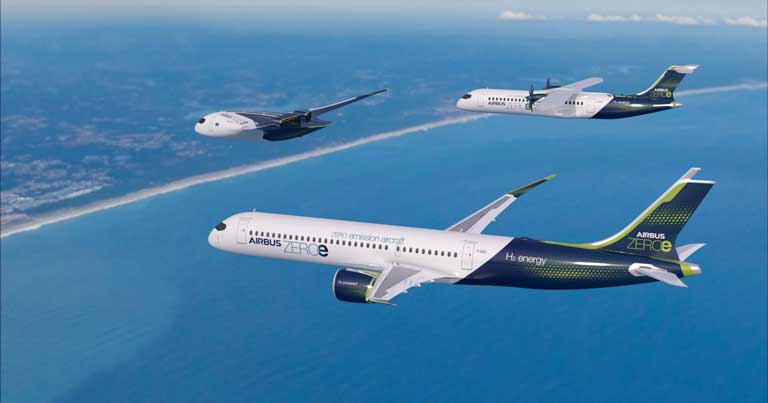
Airbus has revealed three concepts for a zero-emission commercial aircraft which could enter service by 2035. All three concepts rely on hydrogen as a primary power source option which Airbus believes “holds exceptional promise as a clean aviation fuel”.
Guillaume Faury, CEO, Airbus, said: “This is a historic moment for the commercial aviation sector as a whole and we intend to play a leading role in the most important transition this industry has ever seen. The concepts we unveil today offer the world a glimpse of our ambition to drive a bold vision for the future of zero-emission flight.”
He added: “I strongly believe that the use of hydrogen – both in synthetic fuels and as a primary power source for commercial aircraft – has the potential to significantly reduce aviation’s climate impact.”
The three concepts designs include a turbofan single-aisle aircraft, a smaller turboprop and a larger blended-wing, with each representing a different approach to achieving zero-emission flight through various technology pathways and aerodynamic configurations in order to support Airbus’ ambition of leading the way in the decarbonisation of the entire aviation industry.
“These concepts will help us explore and mature the design and layout of the world’s first climate-neutral, zero-emission commercial aircraft, which we aim to put into service by 2035,” explained Faury. “The transition to hydrogen, as the primary power source for these concept planes, will require decisive action from the entire aviation ecosystem. Together with the support from government and industrial partners we can rise up to this challenge to scale-up renewable energy and hydrogen for the sustainable future of the aviation industry.”
In order to tackle these challenges, airports will require significant hydrogen transport and refuelling infrastructure to meet the needs of day-to-day operations. Airbus also says that support from governments will be key to meet these objectives with increased funding for research & technology, digitalisation, and mechanisms that encourage the use of sustainable fuels and the renewal of aircraft fleets to allow airlines to retire older, less environmentally friendly aircraft.







